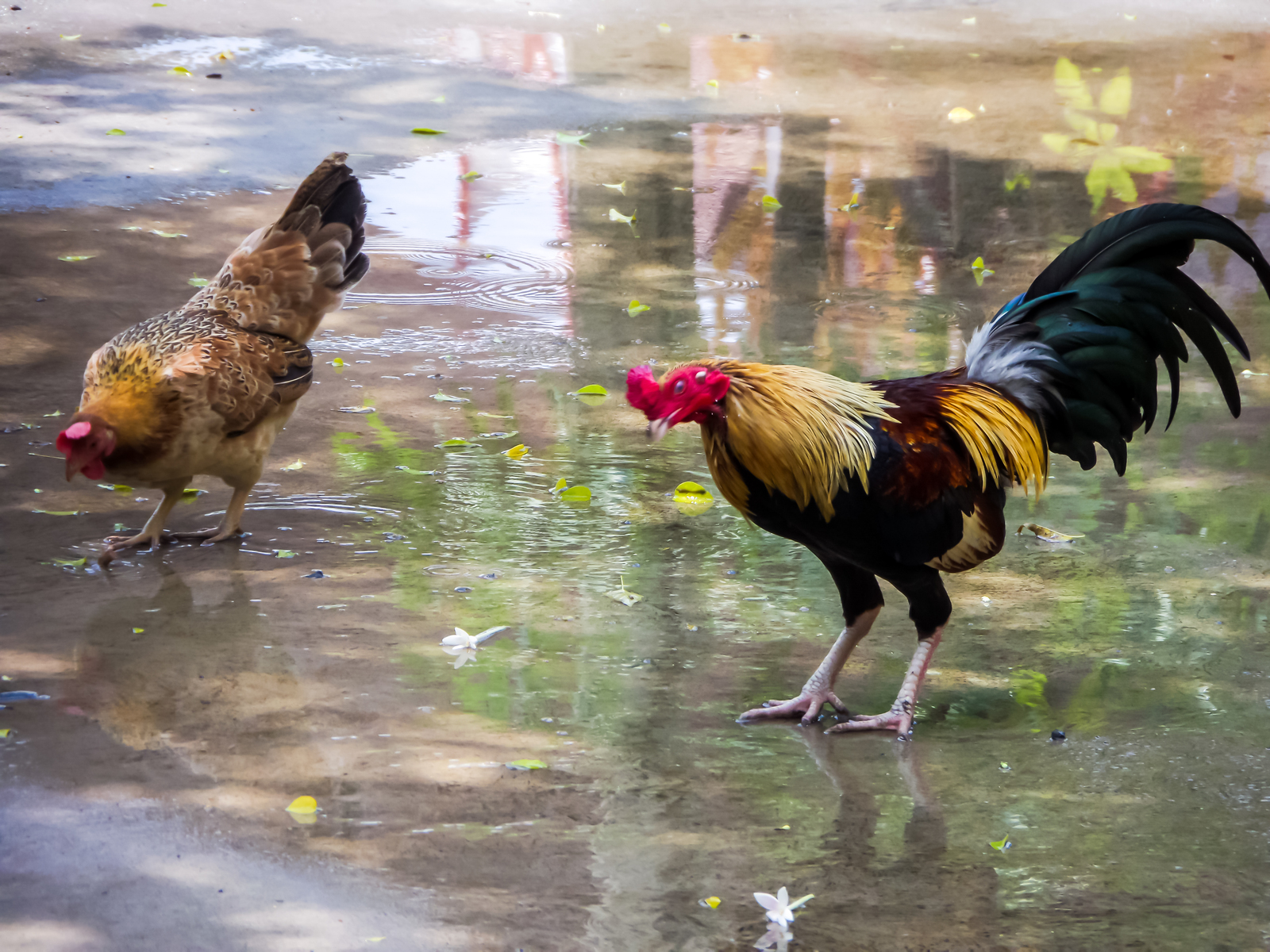Chickens are a common starter animal for homesteaders, but if you are inexperienced at keeping chickens, you may be disturbed by some of the behavior you see in your flock. Will chickens kill each other, and what causes chickens to behave in this way?
Chickens will kill each other if kept in conditions and circumstances promoting this behavior. Certain chicken breeds are more aggressive than others are, and more likely to display aggression than docile breeds. Keep meat and egg chickens separate and prevent overcrowding.
We will explore the dark side of keeping chickens and find out if chickens will kill each other, the reasons why chickens may exhibit aggressive behavior, the signs of aggression to look out for, and how to prevent and manage chicken aggression.
Why Do Chickens Attack Each Other?
Chickens are favored on the homestead because they are relatively easy to raise and can provide a sustainable and regular food source in the form of eggs and meat.
Keeping any livestock on the homestead requires understanding the animals’ needs, behavior, and habits to ensure a healthy, happy environment.
Many people think chickens are docile, gentle farmyard animals and are devastated when they see chickens kill or attack each other.
However, like any other animal, chickens can behave aggressively toward each other. Understanding chicken behavior is important for anyone who keeps them, whether as a source of food or as pets.
Will Chickens Kill Other Chickens?
The unfortunate answer to this question is that chickens will kill each other, but the good news is that this is generally not normal behavior, and you can take action to avoid or stop this problem in your chicken flock.
The likelihood of chickens killing each other depends on several factors.
Certain Chicken Breeds Are More Aggressive
Some chicken breeds are naturally more aggressive than others, and this can be due to their genetic makeup or an undesirable trait that develops in certain breeds. Research chickens carefully before deciding on a certain breed for your homestead.
Certain breeds may be bred to be more aggressive in order to protect the flock against predators or other dangers, but this trait can sometimes be turned on their own kind when there is a dispute, competition for food, or younger chickens ignore the hierarchy in the flock.
In my experience, some aggressive chicken species may even kill weak, sick, or old chickens in the flock because they are a risk to the overall safety of the flock. These chickens in a weakened state can attract predators to the area to hunt the weaker members and put the entire flock in danger.
Some of the most aggressive chicken breeds are as follows.
- Cornish chickens – a British breed.
- Brahma chickens – a US breed.
- Dorking chickens – a British breed.
- Lackenvelder chickens – a Dutch breed.
- Old English Game Chickens – a British breed.
These chicken breeds are known to show aggression towards humans and other animals and will also occasionally kill other chickens in their own flock.
Some chicken breeds known to be more docile and less aggressive, and which may be a better choice for those beginning with chickens include the following.
- Australorps.
- Cochins.
- Orpingtons
- Silkies.
- Speckled Sussex.
Generally, chickens bred for egg-laying are more docile than those bred for meat. Chickens suitable for eggs and meat age are generally not as aggressive as pure meat breeds.
Chicken Age Can Affect Aggression
The age of the chickens in your flock can be a contributing factor to promoting aggression. If you buy a batch of chickens all the same age, the young chickens have no hierarchy or pecking order in place, and they will show aggression toward their peers.
This aggression can become carried away, and weaker chickens may be severely bullied and attacked, even to the point of death, but the stronger chickens in the group.
One of the best methods I have found that curb this behavior is to keep some older adult chickens, and when the youngsters are trying to find their pecking order, put them with the adults.
The young chickens will soon learn the existing pecking order, which reduces the fighting in the group of young chickens.
Chicken Gender Can Affect Aggression
Roosters are good to have if you want a self-sustaining flock on your homestead, but they can become problematic.
Roosters are generally more territorial and aggressive than hens, especially during mating season. Too many roosters on the homestead is not a good thing. Non-dominant roosters may become frustrated and will take their aggression out on other weaker chickens in the flock.
Excess roosters on the homestead should become food for you to avoid them becoming a problem in the chicken coop.
The Environment Can Affect Chicken Aggression
The environment in which the chickens are kept can be a problem and lead to aggression between flock members.
Keeping chickens in a cramped space with limited resources, such as food and water, can increase stress levels and lead to aggressive behavior.
Overcrowding in the chicken coop does not allow chickens lower in the pecking order to give the appropriate space and deference to the chickens higher in the pecking order.
The lack of space will lead to fighting, resulting in younger, weaker chickens being killed by the older dominant individuals in the group. Overcrowding in the coop can also contribute to the spread of disease, increasing aggression levels against disease-weakened chickens.
It is important to understand the needs of your chickens and give them an environment that will meet their requirements and reduce aggression in the flock.
While it may sound like I am painting a gruesome picture of chicken behavior, it is important to note that this behavior is often a stress response rather than normal chicken behavior.
If your chickens are displaying aggression towards each other, you must investigate the root cause to eliminate the problem and restore calmness and order to the flock. Understanding these factors is important in preventing and managing chicken aggression.
As a rule of thumb, smaller chicken breeds need at least 2 sq feet per bird in the coop. Medium-sized chickens need 4 sq feet per bird, and large breed chickens need 8 sq feet per bird.
Keeping Mixed Breeds Can Cause Aggression In Chickens
If you keep different chicken breeds on the homestead for different purposes, such as chickens for meat and chickens for eggs, you may have a problem with chickens killing each other.
Chickens bred for meat are generally not as docile as chickens bred for egg-laying. Keeping these different chicken breeds together in the same enclosure can result in aggression between the chickens.
The more docile egg-laying chickens may be bullied, harassed, or attacked by the more dominant and aggressive meat chicken breeds. If left unchecked, this behavior can result in chickens being killed by the more aggressive breed.
The solution is fairly simple but requires a doubling up of your chicken space. You must have a separate chicken coop for your egg-laying chickens and your meat chickens.
Some Chickens May Have An Aggressive Nature
Even though you have a relatively docile chicken breed, you may occasionally find an individual that simply has a nasty, aggressive nature.
This may be a throwback to previous traits in the breed, a genetic aberration, or just a mean-natured chicken.
I have found that there is generally nothing you can do to change the behavior in chickens of this nature, and unless you want to deal with disruptive, distressing behavior in your flock, there is only one solution. Get rid of the bird.
You can choose to give the chicken away or slaughter it for food for your family on the homestead. Either way, keeping these aggressive chickens with the rest of your flock is not wise.
Signs Of Aggression In Chickens
It’s important for homesteaders to be able to recognize the signs of aggression in chickens so that they can intervene before the behavior escalates to the point of causing harm.
Here are some typical signs to look out for in your chicken flock to stop aggression before it gets out of control.
- Physical signs. If you notice any injuries on your chickens, this could be a sign of aggression. Common injuries include missing feathers, wounds, and bruises.
- Behavioral signs. Chickens may exhibit several behavioral signs of aggression, such as aggressive lunging or chasing.
- Pecking. Chickens may peck at each other as a sign of dominance or aggression. While this is a common display to reinforce pecking order, it should not be overly frequent or cause wounds.
- Mounting. Roosters may mount other chickens, which can be a sign of aggression towards hens or dominant behavior towards other roosters.
- Vocalizations. Chickens may make loud and aggressive sounds toward other chickens.
- Limited resources. Chickens fighting around food or water bowls may indicate competition for food and water. Add more food and water bowls to eliminate this issue.
- Introducing new chickens. Introducing new chickens into a flock can cause aggression as they establish their social hierarchy. Always be vigilant for signs of aggression in the flock for a few days after introducing new birds.
Monitoring your flock for these signs and potential causes of aggression will help you to take steps to rectify the situation before there are injuries or deaths in the flock.
Conclusion
Chickens do not often attack or kill each other unless there is a source of stress in the chicken coop. Various factors can promote aggressive behavior in chickens, so it is important to provide enough space and food resources and keep meat chickens separate from egg-laying chickens.
Monitoring your flock daily will help you take swift action when you notice aggressive behavior and nip it in the bud before it results in injuries or fatalities.
References
https://www.daltonengineering.co.uk/blogs/news/will-chickens-kill-eat-each-other


